- Home
- Ken Follett
The Evening and the Morning Page 40
The Evening and the Morning Read online
Page 40
“He’s a sly dog. He went behind my back to the archbishop of Canterbury, and tried to take over my minster at Dreng’s Ferry.”
“Does he have a weakness?”
“There was an incident in his youth, an affair with another young monk.”
“Anything since?”
“No.”
“Useful ammunition, perhaps, but if the behavior hasn’t been repeated then it’s not enough to bring him down. Living without women, I should think half those monks are diddling one another in the dorm.”
“I’m not worried about Aldred. I squashed him once, I can do it again.”
Gytha was not reassured. “I don’t understand it,” she fretted. “What would a monk want with the sheriff?”
“I’m more worried about the Norman bitch.”
Gytha nodded agreement. “Ragna is smart and she’s bold.”
“She outmaneuvered me at Outhenham. Not many people can do that.”
“And she got Wilf to sack the head groom, Wignoth, who lamed her horse for me.”
Wynstan sighed. “It was such a mistake for us to let Wilf marry her.”
“When you negotiated that, you were hoping to reinforce the treaty with Count Hubert.”
“It was more because Wilf wanted her so badly.”
“You could have prevented the marriage.”
“I know,” Wynstan said ruefully. “I could have come home from Cherbourg saying we were too late, she was already engaged to marry Guillaume of Reims.” He considered his explanation. He could usually tell his mother the truth: she was on his side regardless. “Wilf had only just got me appointed bishop, and the sad fact is that I didn’t have the nerve. I was afraid he might guess what I’d done. I thought his wrath would be terrible. In fact I could almost certainly have got away with it. But I didn’t know that then.”
“Don’t worry about Ragna,” said Gytha. “We can handle her. She has no idea of the forces she’s up against.”
“I’m not so sure.”
“In any case, we’d be foolish to move against her now. She holds his heart in her hand.” Gytha smiled with a twisted mouth. “But a man’s love is temporary. Give Wilf time to tire of her.”
“How long will that take?”
“I don’t know. Be patient. The time will come.”
“I love you, Mother.”
“I love you, too, my son.”
* * *
Some mornings the fish trap was full, sometimes half full, occasionally empty but for a few tiddlers, but in any week there was more than the family could eat. They hung fish from the rafters to smoke until it seemed to be raining eels. One Friday when the trap came up full Edgar decided to sell some.
He found a stick a yard long and attached twelve fat eels to it, using green twigs as cords, then went to the alehouse. He found Ethel, Dreng’s younger wife, sitting outside in the late summer sun, plucking doves for the pot, her bony hands red and greasy from the work. “Do you want some eels?” he said. “A farthing for two.”
“Where did you get them?”
“From our flooded hayfield.”
“Well done. They’re nice and plump. Yes, I’ll have two.”
She went inside to ask Dreng for the money, and he came out with her. “Where did you get them?” he asked Edgar.
“I found an eel’s nest in a tree,” Edgar said.
“Impertinent as always,” Dreng said, but he gave Edgar a quarter of a silver penny, and Edgar walked on.
He sold two to the laundress, Ebba, and four to Fat Bebbe. Elfburg, who did the cleaning at the minster, said she did not have any money, but her husband, Hadwine, had gone into the forest for the day to collect nuts, and she knew another way to pay Edgar. He declined the offer but gave her two eels anyway.
With four farthings in his belt pouch, Edgar took the remaining fish to the priests.
Degbert’s wife, Edith, was breastfeeding a baby outside the house. “They look nice,” she said.
“You can have all four for half a penny,” he said.
“You’d better ask him,” Edith said, with a jerk of her head toward the open door.
Degbert heard the voices and came out. “Where did you get those?” he said to Edgar.
Edgar suppressed a sarcastic answer. “The flooding has made a fishpond in our hayfield.”
“And who said you could take eels from it?
“The fish didn’t ask permission to swim to our farm.”
Degbert looked at Edgar’s stick. “You seem to have sold some already.”
Reluctantly, Edgar said: “I’ve sold eight.”
“You forget that I’m the landlord here. You rent the farm, not the river. If you want to make a fishpond, you need my agreement.”
“Do I? I thought you were lord of the land, not lord of the river.”
“You’re an uneducated peasant who doesn’t know anything. The minster has a charter that gives me fishing rights.”
“In the time I’ve been here you’ve never caught a single fish.”
“Makes no difference. What’s written is written.”
“Where is this charter?”
Degbert smiled. “Wait there.” He went inside and returned holding a folded sheet of parchment. “Here it is,” he said, pointing at a paragraph. “If any man take fish from the river he shall owe the dean one fish in three.” He grinned.
Edgar did not look at the parchment. He could not read, and Degbert knew it. The charter might say anything. He felt humiliated. It was true, he was an ignorant peasant.
Degbert said triumphantly: “You took twelve eels, so you owe me four.”
Edgar handed over his stick of eels.
Then he heard hoofbeats.
He looked up the hill, and Degbert and Edith did the same. Half a dozen horsemen thundered down to the minster and reined in. Edgar recognized their leader as Bishop Wynstan.
While Degbert was welcoming his distinguished cousin, Edgar walked briskly away. He passed the tavern and crossed the field. His brothers were tying reaped stalks of oats into sheaves, but he did not speak to them. He bypassed the farmhouse and quietly slipped into the forest.
He knew his way. He followed a barely visible deer track through stands of oak and hornbeam for a mile and came to a clearing. Sheriff Den was there with Brother Aldred and twenty men and horses. They made a formidable group, the men heavily armed with swords, shields, and helmets, the horses powerfully muscled. Two men drew weapons as Edgar appeared, and he recognized them: the short, nasty-looking one was Wigbert, the big man Godwine. Edgar raised his hands to show that he was unarmed.
Aldred said: “It’s all right, he’s our spy in the hamlet,” and the men sheathed their blades.
Edgar winced. He did not like to think of himself as a spy.
He had agonized over this. The forgers were going to be found out, and their punishment would be cruel. Degbert deserved everything he would get, but what about Cuthbert? He was a weak man who did what he was told. He had been bullied into committing a crime.
However, Edgar had a horror of lawlessness. Ma would always argue with those in authority but never cheat them. Lawlessness was represented by the Vikings who had killed Sunni, and by Ironface the outlaw, and by people such as Wynstan and Degbert, who robbed the poor while pretending to care for their souls. The best people were rule keepers, clergymen such as Aldred and nobles such as Ragna.
Edgar sighed. “Yes, I’m the spy,” he said. “And Bishop Wynstan has just arrived.”
Den said: “Good.” He glanced up. Little sky was visible between the leaves, but the strong light of noon had softened to a late afternoon radiance.
Edgar answered Den’s unspoken question. “They won’t get much done in the forge today. It will take time to heat the fire and melt down the pennies.”
“So the
y’ll start tomorrow.”
“I’d guess they’ll be in full swing by midmorning.”
Den looked uneasy. “We can’t take any chances. Can you check on their progress and let us know when it’s a good time for us to raid?”
“Yes.”
“Will they let you into the workshop?”
“No, but that’s how I’ll know. I sometimes talk to the jeweler while he’s working. We discuss tools and metals and—”
“How will you know?” Den interrupted impatiently.
“The only time Cuthbert closes his door is when Wynstan is there. So I’ll knock and ask for Cuthbert. If I’m turned away that will mean they’re doing it.”
Den nodded his graying head. “Good enough,” he said. “Come and let me know. We’ll be ready.”
* * *
That evening Wynstan went around the hamlet and gave every household a side of bacon.
Before breakfast next morning Cuthbert went into his workshop and started a fire, using charcoal, which burned hotter than wood or coal.
Wynstan made sure the outer door of the workshop was closed and barred, then stationed Cnebba outside to stand guard. Finally he handed Cuthbert an ironbound chest full of silver pennies.
Cuthbert took a large clay crucible and buried it in the charcoal up to the rim. As it heated, it gradually turned the red color of the sun at daybreak.
He combined five pounds of copper, in thin slices cut off a cylindrical ingot, with the same weight of silver pennies, mixing them thoroughly, then poured the metal into the crucible. He boosted the flames with a pair of bellows, then as the mixture melted he stirred it with a puddling stick. The wood scorched in the hot metal, but that did no harm. The clay crucible continued to change color, becoming the bright yellow of the sun at noon. The molten metal was a darker shade of yellow.
On his workbench he arranged ten clay molds in a row. Each when full to the brim would hold a pound of the molten mixture: Wynstan and Cuthbert had established this, some time ago, by trial and error.
Finally Cuthbert took the crucible out of the fire, using two pairs of long-handled tongs, and poured the mixture into the clay molds.
The first time Wynstan had witnessed this process he had been scared. Forgery was a very serious crime. Any act that subverted the coinage was treason against the king. The punishment was amputation of a hand, theoretically; but a worse sentence might be imposed.
On that first occasion, when Wynstan was only an archdeacon, he had paced around the minster, going in and out of the forge, ceaselessly looking to see whether anyone was coming. He had behaved, he now realized, like the picture of a guilty man. But no one had dared question him.
He had quickly realized that most people preferred not to know about the crimes of their superiors, for such knowledge could get them into trouble; and he had reinforced this feeling with gifts. Even now he doubted whether the residents of the hamlet guessed what happened four times a year in Cuthbert’s forge.
Wynstan hoped he had not become careless—just more confident.
When the metal had cooled and hardened, Cuthbert turned the molds upside down and ejected fat discs of the copper-silver alloy. Next he hammered each disc, making them thinner and broader, until each one filled a large circle precisely scratched on the bench with dividers. One disc, Wynstan knew, would now provide two hundred and forty blank coins.
Cuthbert had made a punch of exactly the diameter of a penny, and now he used it to cut out blanks from the sheet of alloy. He carefully swept up the leftover fragments to be melted again.
On his bench he had three heavy iron objects of cylindrical shape. Two were dies, painstakingly engraved by Cuthbert with molds for the two sides of a King Ethelred penny. The lower die, called the pile, showed the king’s head, seen in profile, with the title “King of the English” in Latin. Cuthbert set this piece firmly into its slot in the anvil. The upper die, called the trussel, had a cross, plus, deceitfully, the attribution “Made by Elfwine in Shiring,” also in Latin. Last year the design had been modified, making the arms of the cross longer; a change that made life difficult for forgers—which was why the king did it. At its other end the trussel was mushroom shaped from much hammering. The third object was a collar that held the upper and lower dies perfectly aligned.
Cuthbert placed a blank on the pile, slipped the collar on, and inserted the trussel into the collar, letting it down until it rested on the blank. Then he gave the trussel a sharp tap with his iron-headed hammer.
He lifted the trussel and removed the collar. The top of the metal blank was now impressed with the cross. Cuthbert used a blunt knife to prise the coin off the pile, then turned it over to reveal the king’s head on the other side.
It was the wrong color, because the alloy was brown rather than silver. But there was a simple solution to that problem. Using his tongs, Cuthbert heated the coin in the fire then dipped it in a bowl containing dilute vitriol. As Wynstan watched, the acid took the copper away from the surface of the coin, leaving a sort of skin of pure silver.
Wynstan smiled. Money for nothing, he thought. Few sights pleased him more.
Two things gave him joy: money and power. And they were the same, really. He loved to have power over people, and money gave him that. He could not imagine ever having more power and money than he wanted. He was a bishop, but he wanted to be archbishop, and when he achieved that he would strive to become the king’s chancellor, perhaps to be king; and even then he would want more power and money. But life was like that, he thought; you could eat your fill in the evening and still be hungry come breakfast time.
Cuthbert replaced the clay crucible in the fire and refilled it with another measure of mixed real coins and copper pieces.
While it was melting, he hammered the trussel again and popped out another penny.
“Fresh as a virgin’s tit,” Wynstan said appreciatively.
Cuthbert dropped the penny in the vitriol.
There was a sound from outside.
Cuthbert and Wynstan froze and listened in silence.
They heard the voice of Cnebba saying: “Go away.”
A young man’s voice said: “I’ve come to see Cuthbert.”
Cuthbert whispered: “That’s Edgar the builder.”
Wynstan relaxed.
Outside, Cnebba said: “Why do you want Cuthbert?”
“To give him an eel.”
“You can give it to me.”
“I can give it to the devil, but it’s for Cuthbert.”
“Cuthbert is busy. Now piss off.”
“And a very good day to you, too, kind sir.”
“Insolent dog.”
They waited in silence, but there was no more conversation, and after a minute Cuthbert resumed his work. He sped up, inserting the blanks and banging the trussel and popping the pennies out almost like a kitchen maid podding peas. The real moneyer, Elfwine of Shiring, working in a team of three, could produce something like seven hundred coins per hour. Cuthbert dropped the brown pennies in the acid and stopped his work every few minutes to retrieve the newly silvered coins.
Wynstan looked on, fascinated, hardly noticing the passage of time. The hard part, he reflected wryly, was spending the cash. Because copper was not as heavy as silver, the forged coins could not be used for any transaction large enough to require the money to be weighed. But Wynstan used Cuthbert’s pennies in alehouses and whorehouses and gambling dens, where he enjoyed spending freely.
He was watching Cuthbert lift the crucible of molten metal out of the charcoal a second time when his reverie was disturbed by another noise outside. “What now?” he murmured irritably.
This time Cnebba’s tone was different. Speaking to Edgar, he had sounded scornful; now he seemed startled and intimidated, causing Wynstan to frown uneasily. Cnebba said: “Who are you?” in a voice that was loud but anxi
ous. “Where did you all come from? What do you mean by sneaking up on a man like that?”
Cuthbert set the crucible down on the workbench and said: “Oh, Jesus save me. Who is it?”
Someone rattled the door, but it was firmly barred.
Wynstan heard a voice he thought he knew. “There’s another entrance,” it said. “Through the main house.”
Who was that? The name came to him in a moment: Brother Aldred from Shiring Abbey.
Wynstan remembered telling his mother that Aldred was no threat.
“I will have him crucified,” Wynstan muttered.
Cuthbert was standing stock still, paralyzed by fright.
Wynstan looked around quickly. There was incriminating evidence everywhere: adulterated metal, illicit dies, and forged coins. It would be impossible to hide everything: molten metal in a red-hot crucible could not be tucked away into a chest. His only hope was to keep the visitors out of the workshop.
He stepped through the interior door that led into the minster. The clergy and their families were around the room, the men talking, the women preparing vegetables, the children playing. They all looked up suddenly when Wynstan slammed the door.
A moment later, Sheriff Den came in through the main entrance.
He and Wynstan stared at each other for a moment. Wynstan was shocked and dismayed. Aldred had clearly brought Den here, and there could only be one reason for that.
My mother warned me, Wynstan thought, and I didn’t listen.
He recovered his composure with an effort. “Sheriff Den!” he said. “This is a surprise visit. Come in, sit down, have a cup of ale.”
Aldred entered behind Den and pointed to the door behind Wynstan. “The workshop is through there,” he said.
They were followed in by two armed men Wynstan knew as Wigbert and Godwine.
Wynstan had four men-at-arms. Cnebba was guarding the outer door of the workshop. The other three had spent the night in the stables. Where were they now?
More of the sheriff’s men entered the minster, and Wynstan realized that it hardly mattered where his men were: they were hopelessly outnumbered. The wretched cowards had probably lain down their arms already.

 The Pillars of the Earth
The Pillars of the Earth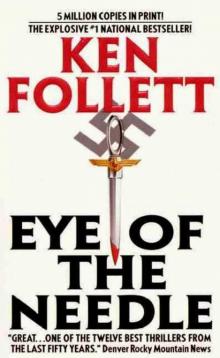 Eye Of The Needle
Eye Of The Needle Lie Down With Lions
Lie Down With Lions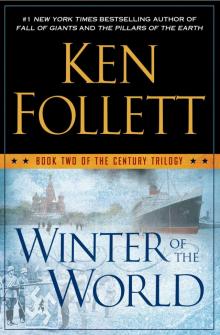 Winter of the World
Winter of the World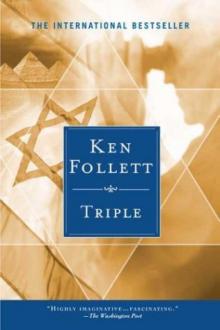 Triple
Triple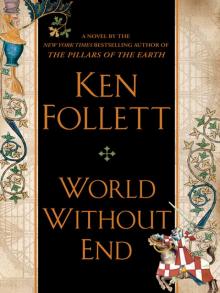 World Without End
World Without End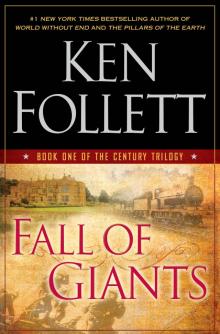 Fall of Giants
Fall of Giants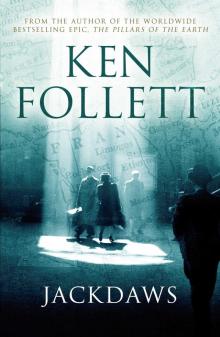 Jackdaws
Jackdaws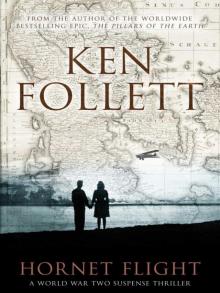 Hornet Flight
Hornet Flight Whiteout
Whiteout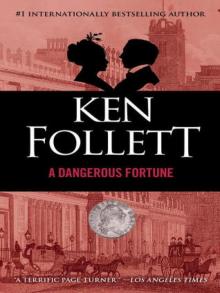 A Dangerous Fortune
A Dangerous Fortune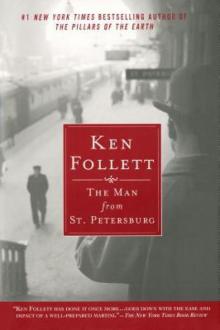 The Man From St. Petersburg
The Man From St. Petersburg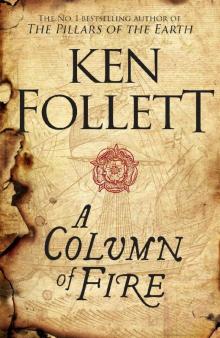 A Column of Fire
A Column of Fire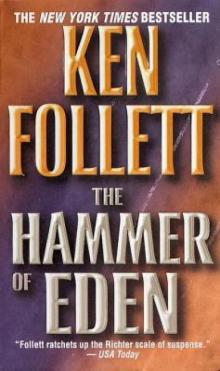 The Hammer of Eden
The Hammer of Eden On Wings of Eagles
On Wings of Eagles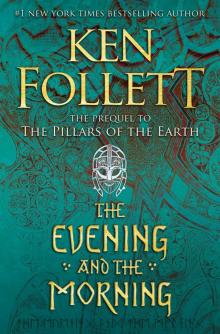 The Evening and the Morning
The Evening and the Morning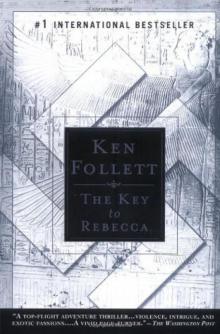 The Key to Rebecca
The Key to Rebecca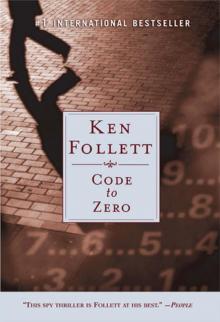 Code to Zero
Code to Zero Paper Money
Paper Money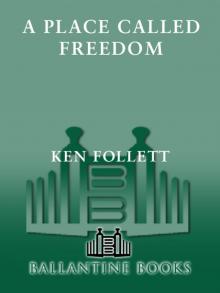 A Place Called Freedom
A Place Called Freedom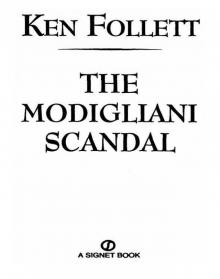 The Modigliani Scandal
The Modigliani Scandal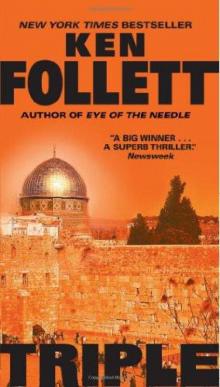 Triple (1991)
Triple (1991)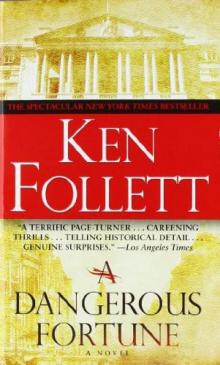 A Dangerous Fortune (1994)
A Dangerous Fortune (1994)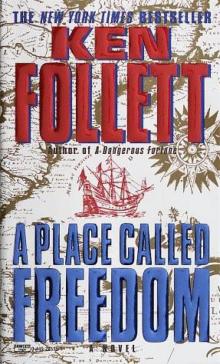 A Place Called Freedom (1995)
A Place Called Freedom (1995)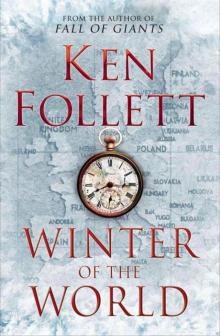 Winter of the World (Century Trilogy 2)
Winter of the World (Century Trilogy 2)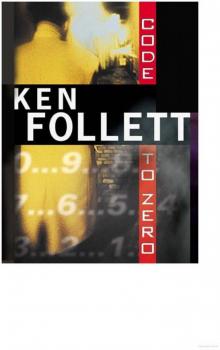 Code to Zero (2000)
Code to Zero (2000)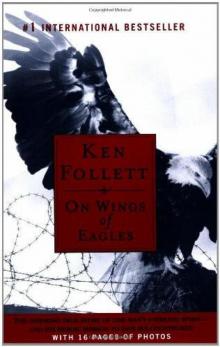 On Wings Of Eagles (1990)
On Wings Of Eagles (1990) Storm Island
Storm Island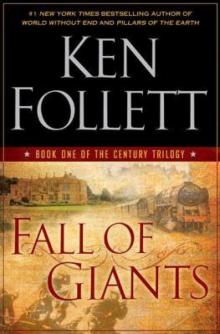 Fall of Giants (The Century Trilogy)
Fall of Giants (The Century Trilogy)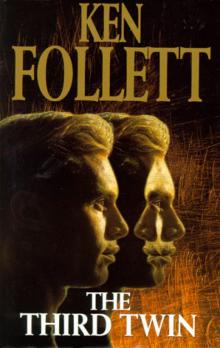 the Third Twin (1996)
the Third Twin (1996)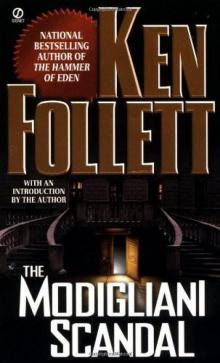 The Modigliani Scandal (1976)
The Modigliani Scandal (1976)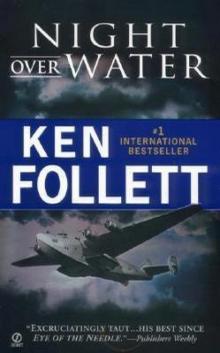 Night Over Water
Night Over Water